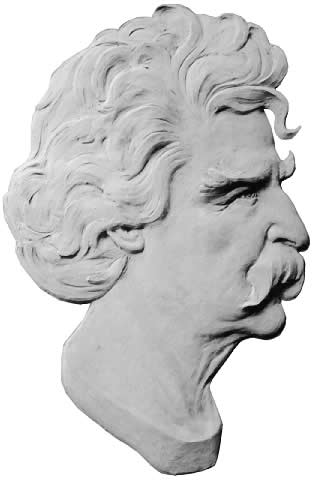

...history can carry on no successful competition with news, in the
matter of sharp interest. When an eye-witness sets down in narrative form some
extraordinary occurrence which he has witnessed, that is news -- that
is the news form, and its interest is absolutely indestructible; time can have
no deteriorating effect upon that episode.
- Autobiography of Mark Twain, Vol. 1 (University of California Press,
2010)
 Photo of Twain bas relief from the Dave Thomson collection. |
A historian who would convey the truth must lie. Often he must enlarge
the truth by diameters, otherwise his reader would not be able to see
it. Herodotus says, "Very few things happen at the right time, and the
rest do not happen at all: The conscientious historian will correct these
defects." It is not worthwhile to try to keep history from repeating itself, for
man's character will always make the preventing of the repetitions impossible. |
|
History requires a world of time and bitter hard work when your "education"
is no further advanced than the cat's; when you are merely stuffing yourself
with a mixed-up mess of empty names and random incidents and elusive dates;
which no one teaches you how to interpret, and which, uninterpreted, pay
you not a farthing's value for your waste of time. The very ink with which all history is written is merely fluid prejudice. |
|
The minor events of history are valuable, although not always showy and picturesque.
- "The Game" instruction sheet for
Mark Twain's Memory Builder
Many public-school children seem to know only two dates--1492 and 4th of July;
and as a rule they don't know what happened on either occasion.
- "The Game" instruction sheet for
Mark Twain's Memory Builder
_____
|
Nature, when pleased with an idea, never tires of applying it. She makes plains; she makes hills; she makes mountains; raises a conspicuous peak at wide intervals; then loftier and rarer ones, continents apart; and finally a supreme one six miles high. She uses this grading process in horses: she turns out myriads of them that are all of one common dull gait; with here and there a faster one; at enormous intervals a conspicuously faster one; and once in a half century a celebrity that does a mile in two minutes. She will repeat that horse every fifty years to the end of time. By the Law of Periodical Repetition, everything which has happened once must happen again and again and again -- and not capriciously, but at regular periods, and each thing in its own period, not another's, and each obeying its own law. The eclipse of the sun, the occultation of Venus, the arrival and departure of the comets, the annual shower of stars -- all these things hint to us that the same Nature which delights in periodical repetition in the skies is the Nature which orders the affairs of the earth. Let us not underrate the value of that hint. Are there any ingenuities whereby you can discredit the law of suicide? No. It is established. If there was such and such a number in such and such a town last year, that number, substantially, will be repeated this year. That number will keep step, arbitrarily, with the increase of population, year after year. Given the population a century hence, you can determine the crop of suicides that will be harvested in that distant year. Will this wonderful civilization of to-day perish? Yes,
everything perishes. Will it rise and exist again? It will -- for nothing
can happen that will not happen again. And again, and still again, forever.
It took more than eight centuries to prepare this civilization -- then
it suddenly began to grow, and in less than a century it is becoming a
bewildering marvel. In time, it will pass away and be forgotten. Ages
will elapse, then it will come again; and not incomplete, but complete;
not an invention nor discovery nor any smallest detail of it missing.
Again it will pass away, and after ages will rise and dazzle the world
again as it dazzles it now -- perfect in all its parts once more. It is
the Law of Periodical Repetition. |
_____
Also see related topic: "How
to Make History Dates Stick" available online at this site.

Quotations | Newspaper Articles | Special Features | Links | Search